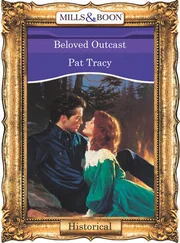That's just too bad.
She had beaten two eggs into yesterday's hominy, formed it into patties and fried them with some ham pieces before Denver woke completely and groaned.
"Back stiff?"
"Ooh yeah."
"Sleeping on the floor's supposed to be good for you."
"Hurts like the devil," said Denver.
"Could be that fall you took."
Denver smiled. "That was fun." She turned to look down at
Beloved snoring lightly. "Should I wake her?"
"No, let her rest."
"She likes to see you off in the morning."
I'll make sure she does," said Sethe, and thought, Be nice to think first, before I talk to her, let her know I know. Think about all I ain't got to remember no more. Do like Baby said: Think on it then lay it down-for good. Paul D convinced me there was a world out there and that I could live in it. Should have known better. Did know better. Whatever is going on outside my door ain't for me.
The world is in this room. This here's all there is and all there needs to be.
They ate like men, ravenous and intent. Saying little, content with the company of the other and the opportunity to look in her eyes.
When Sethe wrapped her head and bundled up to go to town, it was already midmorning. And when she left the house she neither saw the prints nor heard the voices that ringed 124 like a noose.
Trudging in the ruts left earlier by wheels, Sethe was excited to giddiness by the things she no longer had to remember.
I don't have to remember nothing. I don't even have to explain.
She understands it all. I can forget how Baby Suggs' heart collapsed; how we agreed it was consumption without a sign of it in the world.
Her eyes when she brought my food, I can forget that, and how she told me that Howard and Buglar were all right but wouldn't let go each other's hands. Played that way: stayed that way especially in their sleep. She handed me the food from a basket; things wrapped small enough to get through the bars, whispering news: Mr. Bodwin going to see the judge-in chambers, she kept on saying, in chambers, like I knew what it meant or she did. The Colored Ladies of Delaware, Ohio, had drawn up a petition to keep me from being hanged. That two white preachers had come round and wanted to talk to me, pray for me. That a newspaperman came too. She told me the news and I told her I needed something for the rats. She wanted Denver out and slapped her palms when I wouldn't let her go. "Where your earrings?" she said. I'll hold em for you." I told her the jailer took them, to protect me from myself. He thought I could do some harm with the wire. Baby Suggs covered her mouth with her hand. "Schoolteacher left town," she said. "Filed a claim and rode on off. They going to let you out for the burial," she said, "not the funeral, just the burial," and they did. The sheriff came with me and looked away when I fed Denver in the wagon. Neither Howard nor Buglar would let me near them, not even to touch their hair. I believe a lot of folks were there, but I just saw the box. Reverend Pike spoke in a real loud voice, but I didn't catch a word--except the first two, and three months later when Denver was ready for solid food and they let me out for good, I went and got you a gravestone, but I didn't have money enough for the carving so I exchanged (bartered, you might say) what I did have and I'm sorry to this day I never thought to ask him for the whole thing: all I heard of what Reverend Pike said.
Dearly Beloved, which is what you are to me and I don't have to be sorry about getting only one word, and I don't have to remember the slaughterhouse and the Saturday girls who worked its yard. I can forget that what I did changed Baby Suggs' life. No Clearing, no company. Just laundry and shoes. I can forget it all now because as soon as I got the gravestone in place you made your presence known in the house and worried us all to distraction. I didn't understand it then. I thought you were mad with me. And now I know that if you was, you ain't now because you came back here to me and I was right all along: there is no world outside my door. I only need to know one thing. How bad is the scar?
As Sethe walked to work, late for the first time in sixteen years and wrapped in a timeless present, Stamp Paid fought fatigue and the habit of a lifetime. Baby Suggs refused to go to the Clearing because she believed they had won; he refused to acknowledge any such victory. Baby had no back door; so he braved the cold and a wall of talk to knock on the one she did have. He clutched the red ribbon in his pocket for strength. Softly at first, then harder. At the last he banged furiously-disbelieving it could happen. That the door of a house with coloredpeople in it did not fly open in his presence.
He went to the window and wanted to cry. Sure enough, there they were, not a one of them heading for the door. Worrying his scrap of ribbon to shreds, the old man turned and went down the steps.
Now curiosity joined his shame and his debt. Two backs curled away from him as he looked in the window. One had a head he recognized; the other troubled him. He didn't know her and didn't know anybody it could be. Nobody, but nobody visited that house.
After a disagreeable breakfast he went to see Ella and John to find out what they knew. Perhaps there he could find out if, after all these years of clarity, he had misnamed himself and there was yet another debt he owed. Born Joshua, he renamed himself when he handed over his wife to his master's son. Handed her over in the sense that he did not kill anybody, thereby himself, because his wife demanded he stay alive. Otherwise, she reasoned, where and to whom could she return when the boy was through? With that gift, he decided that he didn't owe anybody anything. Whatever his obligations were, that act paid them off. He thought it would make him rambunctious, renegade-a drunkard even, the debtlessness, and in a way it did.
But there was nothing to do with it. Work well; work poorly. Work a little; work not at all. Make sense; make none. Sleep, wake up; like somebody, dislike others. It didn't seem much of a way to live and it brought him no satisfaction. So he extended this debtlessness to other people by helping them pay out and off whatever they owed in misery. Beaten runaways? He ferried them and rendered them paid for; gave them their own bill of sale, so to speak. "You paid it; now life owes you." And the receipt, as it were, was a welcome door that he never had to knock on, like John and Ella's in front of which he stood and said, "Who in there?" only once and she was pulling on the hinge.
"where you been keeping yourself? I told John must be cold if Stamp stay inside."
"Oh, I been out." He took off his cap and massaged his scalp.
"Out where? Not by here." Ella hung two suits of underwear on a line behind the stove.
"Was over to Baby Suggs' this morning."
"What you want in there?" asked Ella. "Somebody invite you in?"
"That's Baby's kin. I don't need no invite to look after her people."
"Sth." Ella was unmoved. She had been Baby Suggs' friend and Sethe's too till the rough time. Except for a nod at the carnival, she hadn't given Sethe the time of day.
"Somebody new in there. A woman. Thought you might know who is she."
"Ain't no new Negroes in this town I don't know about," she said. "what she look like? You sure that wasn't Denver?"
"I know Denver. This girl's narrow."
"You sure?"
"I know what I see."
"Might see anything at all at 124."
"True."
"Better ask Paul D," she said.
"Can't locate him," said Stamp, which was the truth although his efforts to find Paul D had been feeble. He wasn't ready to confront the man whose life he had altered with his graveyard information.
"He's sleeping in the church," said Ella.
"The church!" Stamp was shocked and very hurt.
Читать дальше











